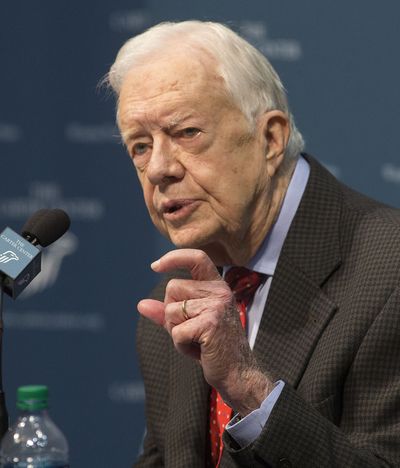Cancer now in his brain, Carter says

The nation’s 39th president, wearing jeans with a red tie and sport coat, strode in to deliver some bad news: He had cancer, it had spread to his brain, and he would be undergoing radiation treatment immediately.
But Jimmy Carter was smiling.
“I’ve had a wonderful life. I’ve had thousands of friends. I’ve had an exciting, adventurous, gratifying existence,” Carter, 90, said during a televised Thursday morning news conference at the Carter Center in Atlanta. “I’ll be prepared for anything that comes.”
Even while facing one of the greatest challenges of his life, Carter once again demonstrated the candor and vitality that has distinguished his post-presidential career as a Nobel Peace Prize-winning humanitarian and international icon.
Carter sometimes cracked jokes and grinned as he discussed the internal melanoma that had spawned a tumor in his liver, four small masses on his brain and was expected to spread.
When asked whether he would have done anything differently, Carter drew laughs when he said he wished he’d sent “one more helicopter” on the botched 1980 rescue attempt of American hostages in Iran – the defining failure of the Democrat’s one-term administration.
“We would have rescued them, and I would have been re-elected,” grinned Carter.
Carter did not directly give a prognosis but was clearly optimistic.
Even as he said he would “fairly dramatically” cut back his work with his beloved Carter Center – the nonprofit he created with his wife, Rosalynn, in 1982, and which he said he would have chosen over another four years in office – Carter promised to continue contributing and to teach Sunday school at church.
“It won’t be tough on my part,” Carter said of his treatment. “I’ll do what the doctors recommend for me to extend my life as much as possible.”
The facts Carter revealed were worrisome: Doctors still don’t know the source of the melanoma, which was first detected in his liver during an exam in May when Carter came down with a cold. (Carter had been in Guyana to observe an election and had to cut the trip short.)
Doctors removed a malignant tumor measuring 2.5 cubic centimeters and about one-tenth of Carter’s liver in early August. After they did, medical scans of his head and neck revealed four small spots on Carter’s brain measuring about 2 millimeters.
No cancer has been discovered in Carter’s pancreas. Pancreatic cancer has killed four of Carter’s family members.
On Thursday afternoon, Carter underwent radiation treatment, and he could undergo more radiation treatments if necessary, although none are now scheduled, his office said.
Carter is expected to also undergo a total of four intravenous treatments with the melanoma drug pembrolizumab at three-week intervals, according to his office.
Carter underwent his first round of intravenous medication Wednesday and said he was in little pain, which he hoped would continue.
“I don’t anticipate any trouble and pain and suffering,” Carter said.
The former president also remained hopeful that he might be able to go to Nepal on his annual trip to build houses with Habitat for Humanity, though it coincides with his final scheduled treatment.
Carter’s announcement Thursday followed a short statement last week confirming he had cancer.
He also revealed Thursday that he initially kept doctors’ reports of a mass on his liver secret from his wife for two weeks in early June. He delayed surgery on his liver to continue a book tour because doctors said the cancer was slow-growing.